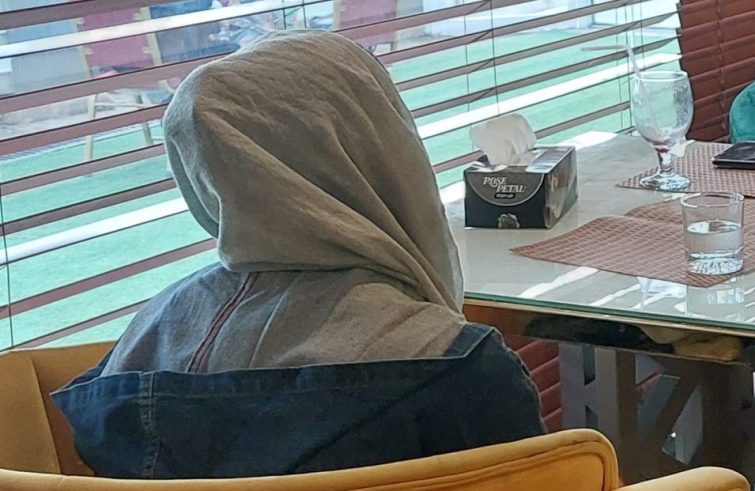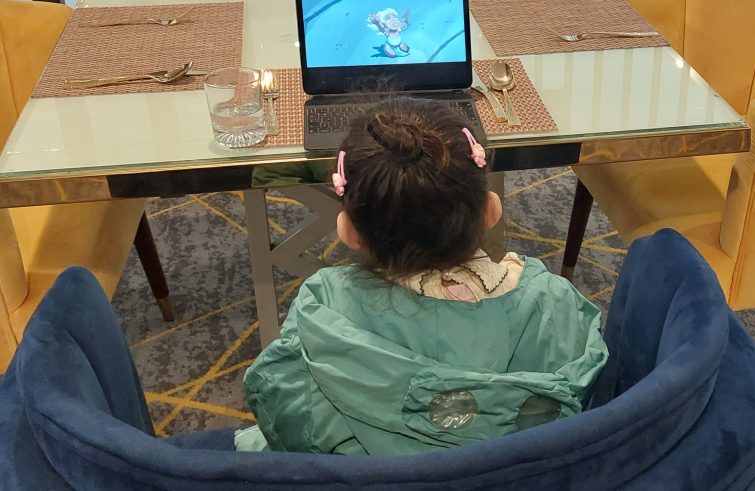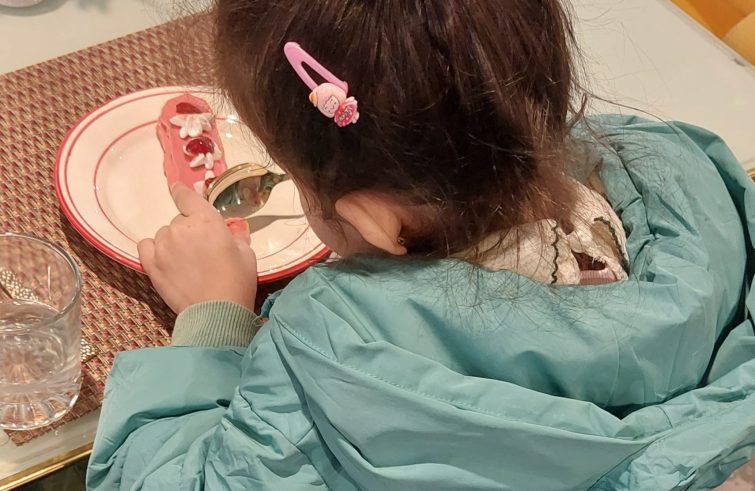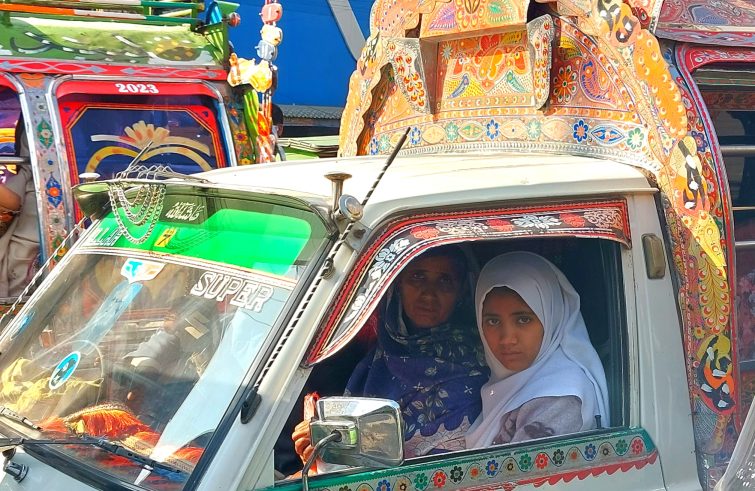
(from Islamabad) – “The Taliban told my husband that if he ever found me, he should stone me to death with his bare hands because I fled my home after he beat me. He hunts me everywhere, he has no idea I am here,” says 30-year-old Fatima, mother of a 3-year-old girl. She is finely dressed for an important day. A grey veil covers her head, and she is wearing a jeans jacket, trousers and black ballerina flats. The child is sitting at a distance, in a small armchair, in front of a tablet that is playing cartoons. On the table, next to a glass of water, are the handkerchiefs she uses to dry her tears. In addition to her passport, Fatima’s painful identification documents are a collage of photos on her mobile phone. Her disfigured face is evidence of the violence she has suffered. A bandaged eye, bruises all over her body, on her face, on her chest. A dramatic testimony, while her pain touches the hearts of all those who listen to her story.
- Fatima (foto: Caiffa/SIR)
- La figlia di Fatima (foto: Caiffa/SIR)
Like many Afghan women, Fatima was forced into marriage to a very wealthy man. From the start, she was subjected to constant abuse and torture. The last time, she was severely beaten, and with great courage, she decided that enough was enough and left for as far as she could.
As a woman with a child, she could not cross the border alone. So she asked a relative for help, who drove her and her daughter to a border town in Pakistan and then returned. When her husband heard that the relative had helped his fleeing wife, he had him arrested by the Taliban. Fortunately for Fatima (a fictitious name to protect her from the enormous risks she is taking), she came across a charitable organisation that helped her reach a shelter for women victims of violence, where she stayed for a few months.
She is now staying with an Afghan family, but she has no future in Pakistan, without a job, estranged from her violent husband. All the more so now that the Pakistani government has decided to expel 1,700,000 undocumented migrants, including 1,400,000 Afghans who arrived years ago or after the Taliban came to power in August 2021. Without the $800 needed to renew a visa, the alternative is imprisonment. More than 300,000 Afghans have already fled or are fleeing en masse from the Torkham border crossing with Afghanistan. They have nothing left and will have to rebuild their lives from scratch under the Taliban regime. Fatima has family in Italy, including a cousin who arrived via an earlier humanitarian corridor.
“We only eat once a day here and I don’t know how we’re going to survive. I have to leave. I have been told that your country is safe.”
She met the Italian Caritas workers in a hotel in Islamabad in the last few days, accompanied by an Afghan cultural mediator who translated from Farsi into English. It was the first interview in the long and complex humanitarian corridors mechanism. Like so many, she is hoping to start a new life. In the course of one afternoon, we heard the painful stories of a family who had lost everything and were now hoping for a brighter future that would allow their three daughters to go to university; of a young gay man; of a couple whose wife, a journalist and voiceover actor, had been arrested and threatened by the Taliban if she resumed her work in television; of a young man who used to work for a prominent member of the previous government’s cabinet, who had also been arrested and tortured.
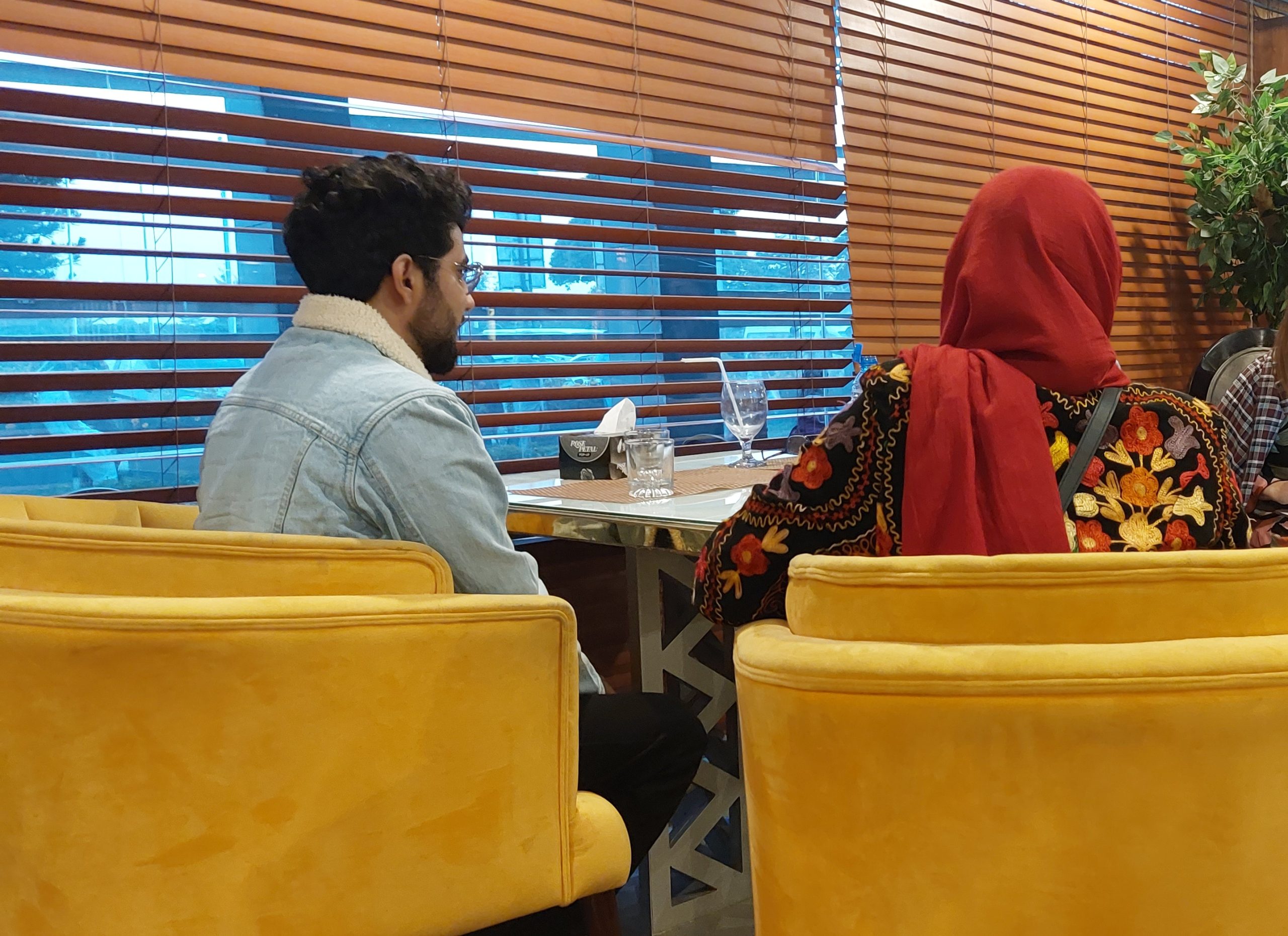 A long time often elapses between the first interview, when aid workers meet these people, ask to see their papers, ask questions, listen to their stories, and finally board the flight that will take them to safety.
A long time often elapses between the first interview, when aid workers meet these people, ask to see their papers, ask questions, listen to their stories, and finally board the flight that will take them to safety.
Before that, they have to go through a complicated and lengthy process that takes more than six months and involves many different parties in Italy and abroad. For the refugees, any journey from Pakistan to Italy is fraught with unknowns. The current situation in Islamabad, for example, is extremely precarious: just a few hours after the first departures, the (paid) exit permits requested by the
93 Afghani refugees, including families with children, have not yet arrived.
Until the last minute, it is uncertain whether some people will have to stay because they need an exit permit.
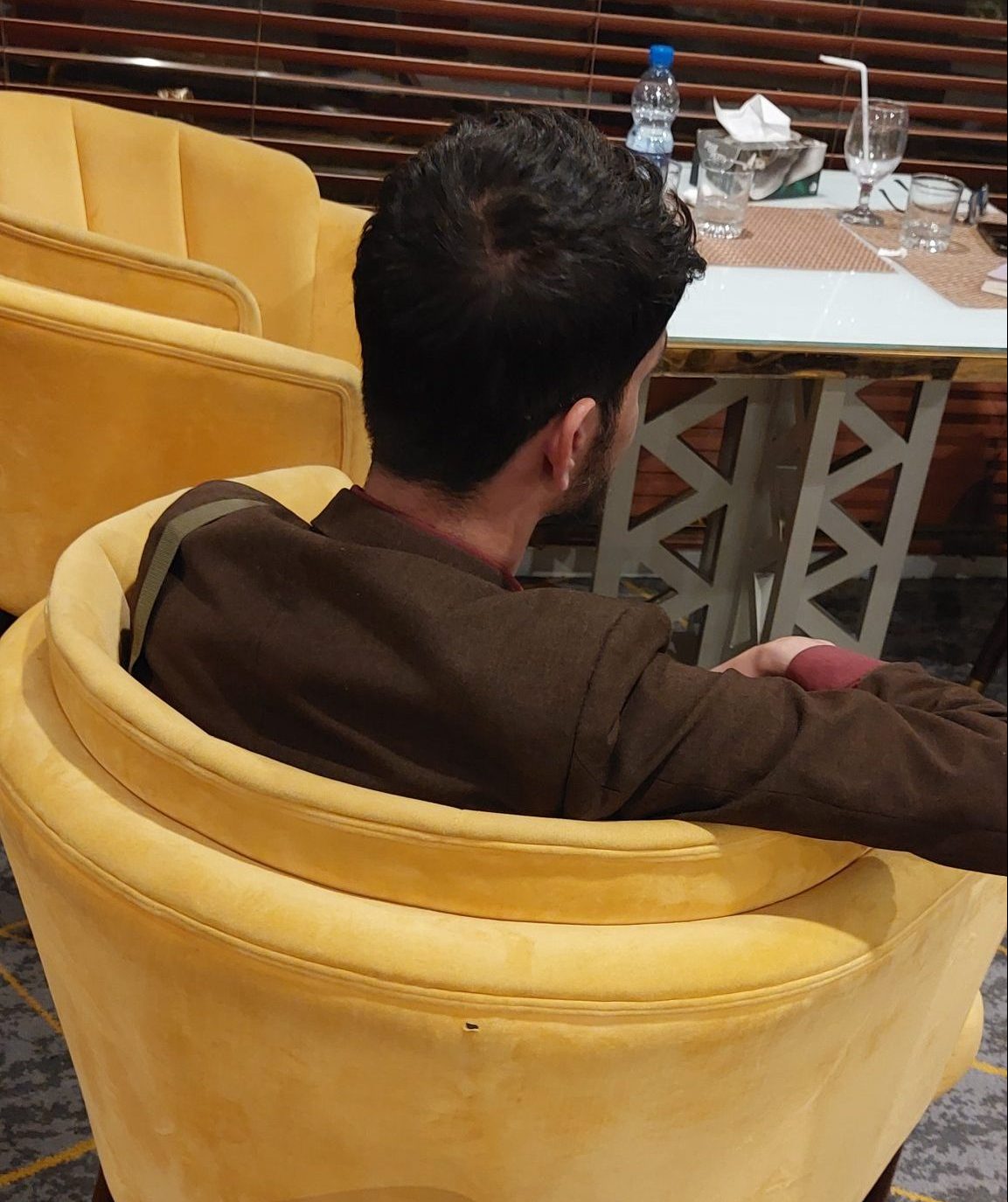 “It has happened before, and it is very painful and frustrating for them and for us,” says Oliviero Forti, in charge of migration policy and international protection at Caritas Italy. He visited Islamabad five times last year. Before each mission, he coordinates relations with the Italian government, which is a signatory to the Humanitarian Corridors Protocol with the Italian Bishops’ Conference, and liaises with the Italian embassy in Pakistan. He also coordinates, handles all the paperwork, interviews candidates for the next Humanitarian Corridors (if quotas are increased or new protocols signed) and provides pre-departure information to all those leaving this week. “We give them all the necessary information about the journey, what they will find in Italy, who will welcome them”.
“It has happened before, and it is very painful and frustrating for them and for us,” says Oliviero Forti, in charge of migration policy and international protection at Caritas Italy. He visited Islamabad five times last year. Before each mission, he coordinates relations with the Italian government, which is a signatory to the Humanitarian Corridors Protocol with the Italian Bishops’ Conference, and liaises with the Italian embassy in Pakistan. He also coordinates, handles all the paperwork, interviews candidates for the next Humanitarian Corridors (if quotas are increased or new protocols signed) and provides pre-departure information to all those leaving this week. “We give them all the necessary information about the journey, what they will find in Italy, who will welcome them”.
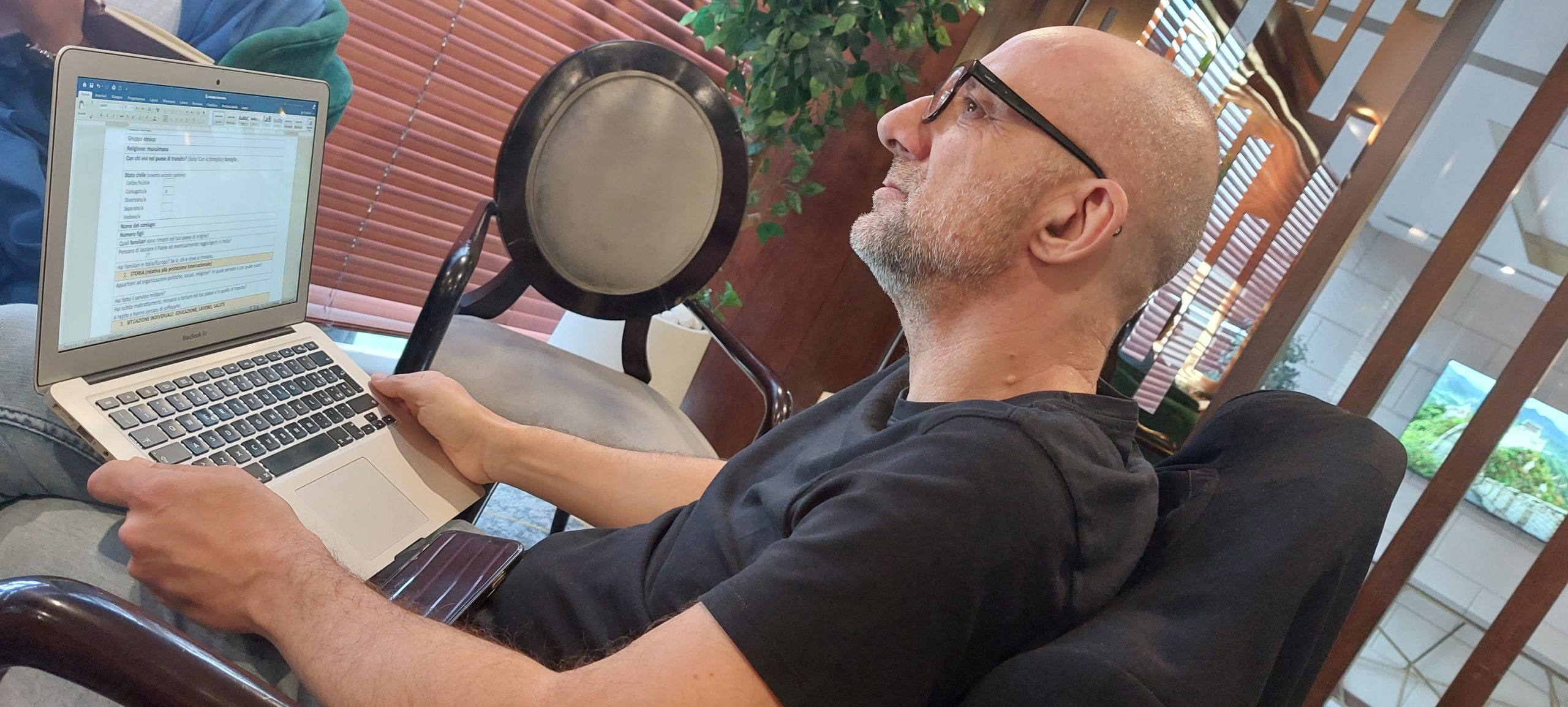 The effort is impressive and does not end with the days in Pakistan. The Caritas office in Rome, in coordination with the relevant government ministries and the International Organisation for Migration (IOM), is busy contacting diocesan Caritas offices to see if they have accommodation available and organising reception procedures at Fiumicino airport. After that, the contacts with the hosts will be continued and all the necessary documents will be followed up.
The effort is impressive and does not end with the days in Pakistan. The Caritas office in Rome, in coordination with the relevant government ministries and the International Organisation for Migration (IOM), is busy contacting diocesan Caritas offices to see if they have accommodation available and organising reception procedures at Fiumicino airport. After that, the contacts with the hosts will be continued and all the necessary documents will be followed up.
Fifteen diocesan Caritas will host this group of refugees, along with one private family.
Their destinations are the cities of Belluno, Biella, Frosinone, Gaeta, Milan, Piana degli Albanesi, Pordenone, Rome, Savona, Sorrento, Tricarico, Udine, Ugento and Verona.
The current protocol started in September 2022 and is nearing its end. “This will be one of the last arrivals of the quota for Caritas Italy, namely 300 people,” says Forti. “The signatory organisations have submitted a request to the Ministry for an extension and an increase of another 200 quotas, and we are waiting for a response.”
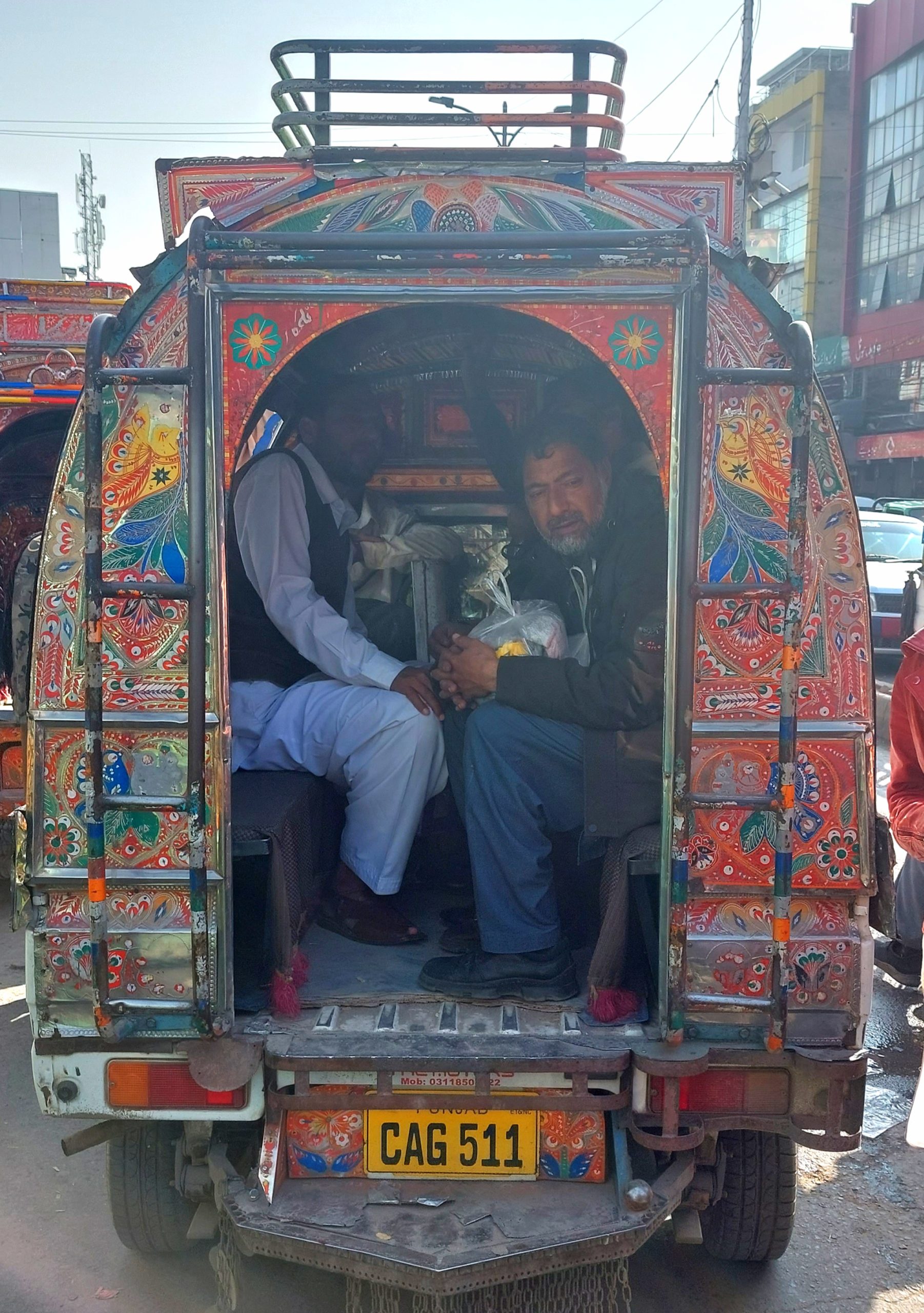 Since 2017, thousands of refugees with various nationalities (mainly Eritreans, South Sudanese, Afghans, Syrians) have been legally and safely brought to Italy from Lebanon, Jordan, Turkey, Pakistan, Ethiopia and Niger, under the terms of the Protocols signed between the Italian government, the Italian Church (“CEI”) acting through Caritas Italy, FCEI (Federation of Italian Evangelical Churches), ARCI and the Community of Sant’Egidio.
Since 2017, thousands of refugees with various nationalities (mainly Eritreans, South Sudanese, Afghans, Syrians) have been legally and safely brought to Italy from Lebanon, Jordan, Turkey, Pakistan, Ethiopia and Niger, under the terms of the Protocols signed between the Italian government, the Italian Church (“CEI”) acting through Caritas Italy, FCEI (Federation of Italian Evangelical Churches), ARCI and the Community of Sant’Egidio.
After the interview, Fatima takes a moment to relax. Forti accompanies her and the child to the hotel cafeteria for a pastry. The child confidently points with her finger and chooses the pinkest of all the pastries. Just like the hoped-for future.

